How To Lose At Dominion
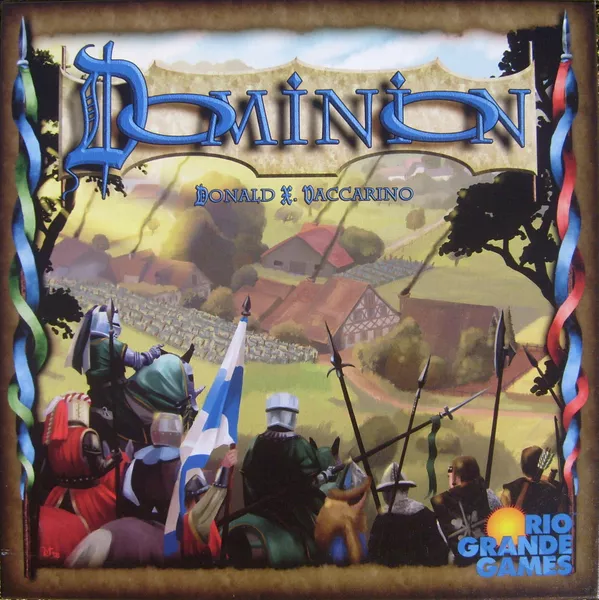
A vague theme running through what I write on here is the off-piste thoughts I have about things that are taken for granted by most people. Until now I have stuck to a rigid and eccentric mix of football and programming. I have long thought I should write book reviews for no reason other than to, in effect, make notes for my own future reference. Anyway, prompted by a few recent, momentous events: the bill for the DNS registration of second-system.blog and the passing of another year, I thought might actually write a book review. I don’t have any obvious candidates at the moment on the book front, sadly. In the meantime, I could write about one of my favourite board games.
Dominion is a very special game. It’s sufficiently deep and challenging that it’s worthy of making notes for myself and because it’s not something beginners play very well, writing about it also fits in with the general blog theme of doing things in a different way.
Dominion is both strategic and tactical, the number of set-ups you can have is astronomical and it’s a very high skill game. It has a framework of simple rules than can be grasped very quickly and a game can be played in 15-25 minutes. I really like all these aspects of Dominion but one thing that really stands out about it is the counter-intuitiveness of what you need to do to play it well. The vast majority of people who start out playing Dominion will do so in a particular way because it obviously seems like the way to go, and they are wrong! I was wrong! It’s so tempting to go about it in a mistaken way, and so easy to overlook what you should try to do and slip back into terrible ways of playing.
Very few games I have played are like this, I would call out Blitzkreig!, The King Is Dead (2nd Ed.) and maybe Heat as possibly the only other games I have played where what you need to do to win is different to how you initially go about it. What you need to do to win at Blitzkreig! is play in a way that is just a little counter-intuitive to the theme, but I think the designer deliberately planned it like that. Heat I need to play more of, and I’m not particularly great at it, but it’s easy to think that the game is all about getting your car around the track and it is that, but managing your deck is a significant consideration too. Finally, The King is Dead is again deliberately designed such that what you do on your turn cuts firmly against itself, I hear good players simply pass for much of the game! Dominion is, I think, not designed to be like this and yet it is much more counter-intuitive than all of these games.
I’ve played a lot of Dominion, I mean really a lot. I’m decent enough now at it but I still forget sometimes about what I need to do and drift back to the intuitive and instinctive ways of the novice. Needless to say, I’ve lost a lot of games of Dominion.
How to win at Dominion
You simply play 30 cards every turn. Of course, this is one of my dry jokes, but it’s based in truth. If you can assemble a deck that plays 30 cards every turn then the world is definitely your oyster and Bob is your elderly male relative.
Dry jokes out of the way, I will now proceed to discuss how to lose at Dominion.
How to lose
Lose? Well, writing a how-to-win guide for Dominion is an epic undertaking because winning requires a lot of correct play for which there are a lot of considerations. In contrast, when I lose it’s usually because I have fallen into one of a few traps - so telling you how to lose is easier and simpler (for me) than telling you how to win.
Way 1: Not distinguishing between cost and value
Dominion is called a “deck-builder”. This term melted my brain before I learned how to play. What on earth is a “deck-builder”? I had played the Pokemon TCG with my son where you would assemble or choose a deck prior to playing, and the playing of the game used this deck. How could the assembling-the-deck part of this process be the game itself? Well, what happens is that taking your turn with the deck culminates in the gaining of additional cards which are added to your deck (OK, OK, as a general rule the composition of your deck changes only when you shuffle). The playing out of your deck and the assembly of it occurs at the same time. This double layering of what’s happening means there is tension in deciding between buying victory cards that you will need to win the game, cards that will help near the end of the game, and cards that will improve your deck right now.
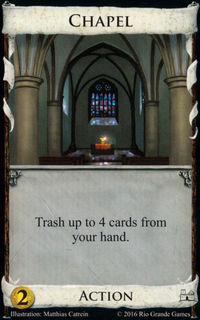
What you need is sometimes a card that costs 2$, 3$, 4$ but the powerful 5$ cards available might be – all things being equal – better cards but what your deck needs now might be a cheaper card. The 3$ card that you need is better than the powerful 5$ card that you don’t, it seems like a terrible waste to spend 8$ on a 3$ card but if that’s what you need then you have to be able to disregard what each card costs in your decision. The human mind instinctively finds the impulse to buy higher cost cards hard to resist. Gold is particularly enticing to the beginner because it costs 6$, more than almost all of the action cards, and it helps you buy victory cards. The beginner that has 7$ to spend on a card doesn’t want to “waste it” and reckons buying a Gold less wasteful than buying a cheaper card.
One of the most counter-intuitive parts of Dominion is that the best card costs just 2$. How can a 2$ card be better for you than a 5, 6 or even 7$ card? It stems from back when Dominion was being conceived, nobody knew how to play it well, and Chapel was clearly intended as a card that a player who is drowning in curses buys with the intended use of trashing the curses and removing them from their deck. Used like that it’s an OK card, costing you a whole turn to clean out a few curses, and sure enough that’s easily worth $2 – actually more than that but the designer didn’t want people to get stuck not able to buy it so he made it 2$ rather than the 4/5/6$ it should really cost. Since getting stuck with a terrible deck is absolutely no fun, and because early Dominion players didn’t really know what they were doing, the best card ended up as one of the cheapest cards. This is not what anyone expects when they first come across Dominion. For 2$, Chapel is surprisingly cheap relative to its power but why is this card so good?
Way 2: Not trashing
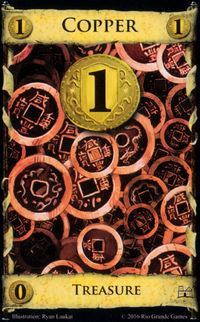
Chapel is good because it allows you to remove bad cards from your deck, henceforth called trashing. It trashes cards and it’s hard to over-emphasise just how important trashing is to your deck. For every card you trash, that’s one bad card you won’t see in any of your future shuffles, every card you buy is now one less card away from showing up in your hand, and one less card away every shuffle. It’s one less card you have to draw. I can’t put it in words actually how good it is because you probably read that explanation and weren’t blown away by it. It’s always better than I imagine it is. Often I will lose because I have a choice between trashing two Coppers and buying a great 5$ card, and I get too excited by the great 5$ card that I neglect to remove two bad cards from the deck. As a yardstick for trashing consider that trashing two coppers (not even estates) is generally better than gaining a 5$ card, and not just slightly better, much better.
Returning to the counter-intuitive nature of Dominion, the newbie sees the Estates and the Coppers and notices that, correctly, the Coppers are in fact helping you get better cards. The newbie may or may not realise that the Estates are a major handicap. Regardless, that Coppers help is true, but the point is that the Copper cards help you a little bit – it’s not that they don’t help you, it’s that other cards are going to help much much more – and having Coppers in your deck literally gets in the way of you playing the good cards. These cards are going to get in the way for every shuffle you carry out. There is a huge opportunity cost here, and it’s hard to get your head around that let alone the magnitude of it.
If it helps you be a bit bolder with your trashing, consider that you don’t often need lots of purchasing power early in the game. Usually, at the outset you have only a single buy and you want to add a 5$ card to your deck, so holding off trashing is often a mistake and piling up on Golds or Silvers doesn’t help very much if at all.
Way 3: No draw
I rarely fall into this trap but if you’re going to win by playing 30 cards a turn then you need to move those cards from your deck in to your hand. There is very real limit to what you will be able can do with five cards, indeed, the five card turn is often a very sad turn. You need to have draw cards in your deck, to fill your hand and to cycle your deck so the good cards you gained will show up in your hand sooner rather than later. I rarely fall in to this trap but when I do it’s usually because there are good cards available that benefit from having few cards in your hand when you play them.
Way 4: No payload
It’s easy to fall into this trap by trashing your bad cards, if you are not careful you will end up with no purchasing power in your buy phase. You absolutely need to bin all your Coppers but if there is no purchasing power on your action cards, then you will need some treasures after all. Silver is a very unexciting card but it will help you work your way up to buying more expensive cards.
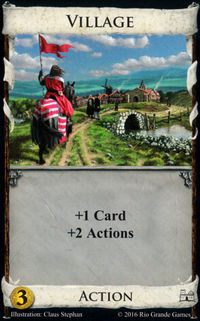
Way 5: Being a village idiot
If you are going to play 30 cards, a lot of them will have to be action cards. And there’s more, if you are going to play a lot of action cards you need enabling cards called Villages which do very little apart from allow you to play more action cards. Sometimes, there will be a single pile of Villages and the fight will be very much on to get the lion’s share of these cards. Again there is an opportunity cost here, if you spent all your turns adding villages then your deck isn’t really getting better, it’s gaining the potential to be better but it’s not improving in any other way. It’s very easy to find yourself in a situation where your opponent has bought cards that improved their deck while you have been building up the potential power of your deck and you have fallen so far behind that the game is clearly already lost.
Way 6: No control over the end of the game
The end of the game in Dominion is triggered by the emptying of card piles, if you don’t have any way of forcing the game to end when you are ahead then it will be a case of pure luck who gets the last province, sometimes it will be you and sometimes it will be your opponent. Playing a game and having the winner come down to a coin-toss is very unsatisfying, well, it is if it isn’t your lucky day. To go from coin-toss finishes to being in control of the end of the game then you need cards that gain cards (or allow you to buy extra cards) so you can stop the game when you are in front of your opponent. You simply must have these cards in your deck when the end is near, but when do you pick them up? You can’t leave it to the last minute because you will be fighting over the victory cards at that point, so you have to get them early on even though they won’t be the best cards for your deck early in the game.
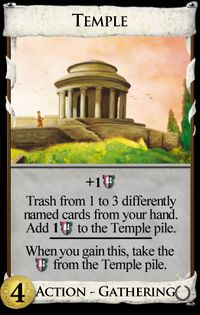
Way 7: Ignoring alternative ways of getting victory points.
The flip side of trashing being better than the brain can comprehend is that victory cards are worse for your deck than you imagine. If there is another way of getting victory points that doesn’t hurt your deck quite so much then it is usually well worth pursuing these cards because green victory cards are so incredibly injurious to your deck and your turns. The terrible, unhelpful cards you should be desperate to remove from your deck at the start of the game will be back once you starting buying victory cards, and if you are like me and you under-estimate trashing, then you will also under-estimate the effects of adding victory cards to your deck. This is Dominion’s catch up mechanism, your opponent may have more points than you but he or she may have poisoned their deck, allowing you to have powerful turns while they trip up on their victory cards. If you can score points without weakening your deck and opening the door for your opponent then you should try to incorporate that into your strategy.
Recap
Of my seven comprehensively tried and tested ways to lose at Dominion, three of them are because what you need to do is not what your human brain is expecting: Disregard the cost of cards, trashing your starting cards, and getting points without poisoning your deck. The other four of them are not in themselves surprising discoveries but pitfalls for the unwary who are at least not making beginner mistakes. I’m not a beginner, but I still listen to my naive instincts too much and I still sometimes forget what I am doing and where I am going. Dominion is not an easy game to play well but at least I can aim to avoid playing it badly.